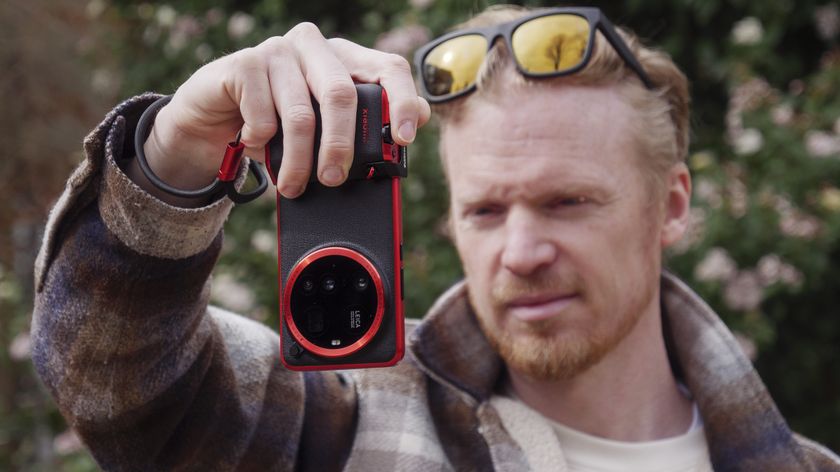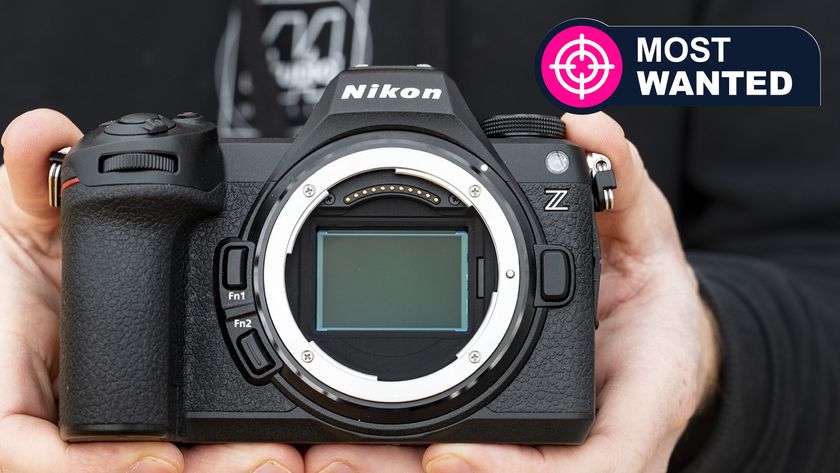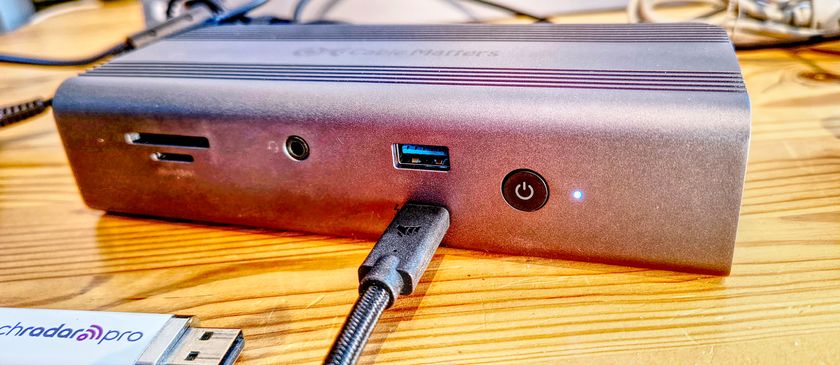The best photos of 2021 (and how to take them)
Dramatic, award-winning photos from a tumultuous year
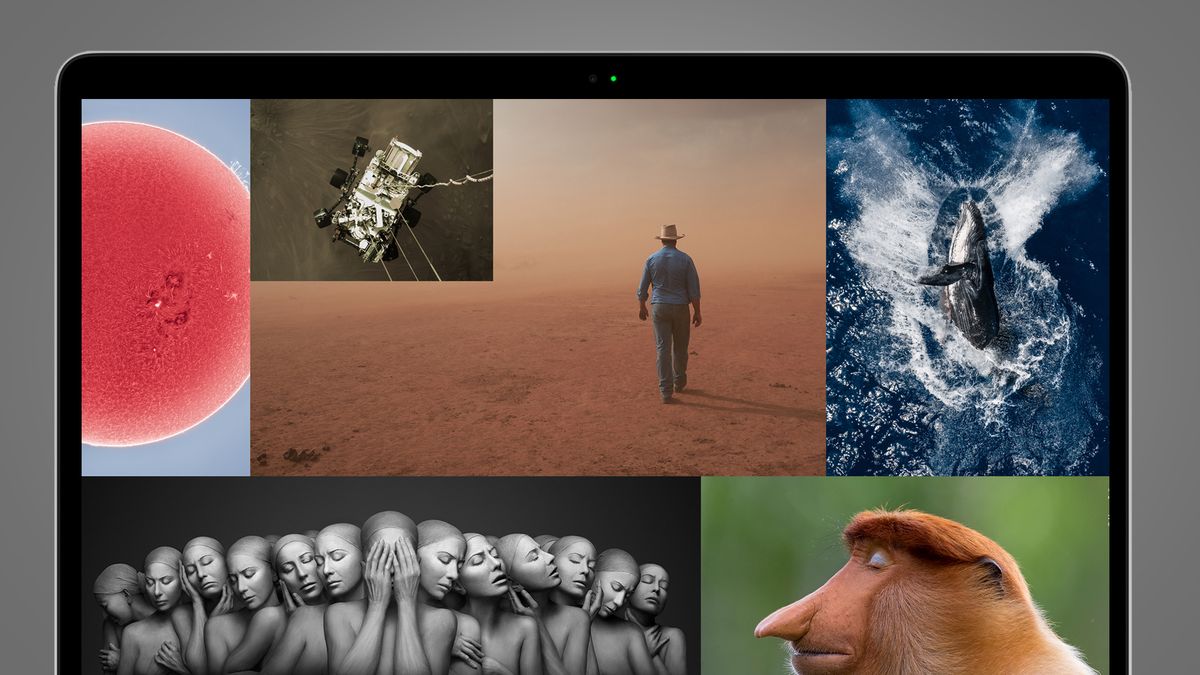
The end of the year is almost upon us – and what better time to reflect on the last 12 months than by scrolling through a selection of the best photos from 2021? Luckily, that’s exactly what you’ve found: the gallery below features our pick of the year’s top prize-winning snaps.
To create our all-star list of stunning snaps, we’ve rifled through shortlists, nominees and award-winners from the year’s most prestigious photography competitions. From Wildlife Photographer of the Year to the iPhone Photography awards, we’ve cherry-picked our favorite shots from across a wide catalogue of genres and disciplines.
In our digital exhibition, you’ll find stirring portraits, underwater wildlife, aerial angles, astro snaps and more. And if you’re hoping to one day be listed among the competition winners, this list might also help you get there. Every photo included below is outstanding in its own right, and studying how they were captured could inspire you to hone your skills and try something similar.
That’s why we’ve included the backstory for each image, with insight from the photographers themselves into how they got the shot. Where possible, we’ve also explained the settings and equipment they used, in case you’re keen to replicate their efforts – although some will be harder to imitate than others (unless you’re daring enough to dive into the murky depths with your DSLR).
Of course, you might simply want to flick through a catalogue of incredible images from 2021. We’re not here to judge – the competition adjudicators already did that for us. So here they are: the best photos of the year.
Portraits
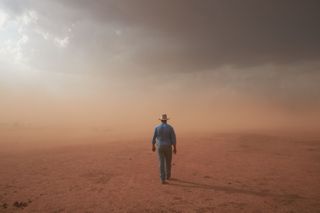
- 'Drought Story', by Joel Pratley (Winner of the National Photographic Portrait Prize 2021)
No, this wasn't shot by the Mars Perseverance Rover. Instead, this winning photo from Australia's National Photographic Portrait Prize shows farmer David Kalisch walking into a huge dust storm on his drought-struck farm. The judges said that it "captures the fragility and uncertainty of the times" and labelled it "an extraordinarily powerful image".
Photographer Joel Pratley says the photo was very much "about being in the right place at the right time". He was actually on a photoshoot aimed at raising awareness for Rural Aid when "an immense dust storm hit highlighting the enormity of the challenges faced by farmers". The shot was taken on a Canon EOS R with an RF 28-70mm f/2L USM lens – and if you were wondering about that camera's level of dust-resistance, this shot is a ringing endorsement.
Get daily insight, inspiration and deals in your inbox
Sign up for breaking news, reviews, opinion, top tech deals, and more.

- 'Solitude' by Forough Yavari (Overall Winner, 2021 International Portrait Photographer of the Year)
This moving panorama was created in the early stages of the pandemic when photographer Forough Yavari found herself "disconnected from my mother and sister and it made me feel powerless and scared", she says. Then, "one day when I was feeling depressed, I decided to paint myself, put the camera on self-timer and capture all the emotions I had", she adds.
Though there was no plan to do anything with the photos at the time – she later "decided to do something with them: a panorama image expressing all my feelings of loss, feelings of helplessness and then confronting loss". The result is something of a monument to many people's pandemic experience and one that recalls the painters who inspire her photography, including Rembrandt, Delacroix and Goya.
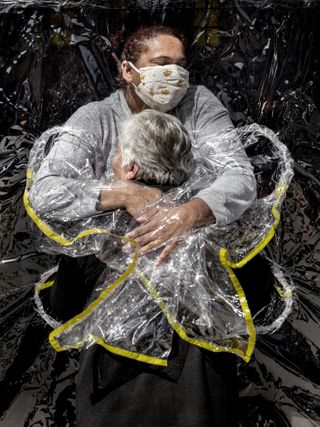
- 'The First Embrace' by Mads Nissen (Winner, World Press Photo of the Year 2021)
This iconic photo shows the first hug that Rosa, an 85-year-old resident at a São Paulo care home, had apparently received in five months. Brazil's care homes had closed their doors to all visitors due to the pandemic and carers had been told to keep physical contact with the vulnerable to a bare minimum. But the care home came up with a simple invention, 'The Hug Curtain', which allowed people to embrace again.
The photo was shot using a Canon EOS 5D Mark III at a 50mm focal length, with the Danish photographer Mads Nissen using settings of 1/600 sec at f/5.6, ISO 200. Nissen has worked as a staff photographer at the Danish daily Politiken since 2014, and you'll likely have come across his work in the likes of Time, Newsweek, CNN, National Geographic, The Guardian, Stern, and Der Spiegel among others.
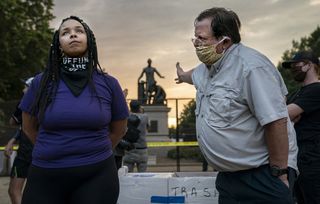
- 'Emancipation Memorial Debate' by Evelyn Hockstein (Nominee for World Press Photo of the Year 2021)
In a flashpoint that's been seen in many cities around the world, this powerful shot shows two people disagreeing about the removal of the Emancipation Memorial, in Washington DC's Lincoln Park. On 25 June around 100 people gathered at the monument arguing about what it meant, but eventually the US Congress introduced a bill to have the statue removed and taken to a museum.
Shot with a Sony Alpha A9 II and a 24-70mm lens, the Washington-based photojournalist Evelyn Hockstein used settings of 1/200 at f/2.8, ISO 1250, to separate her subjects from the background, which stills contains the recognizable shape of the memorial.
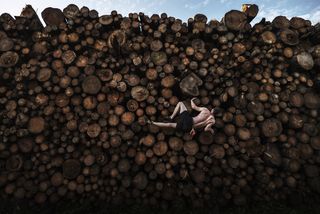
- 'Log Pile Bouldering' by Adam Pretty (1st Prize in 'Sports' category, World Press Photo of the Year 2021)
What strange fitness rituals did you come up with in lockdown to keep yourself trim? When rock-climbing gyms in Munich were closed due to the pandemic, keen climber Georg practiced his bouldering on a log pile instead – and also starred in an image that landed pro sports photographer Adam Pretty the top prize in the 'Sports' category of the World Press Photo Awards.
For this shot, Adam Pretty used the full-frame Panasonic Lumix S5 at a fairly wide 16mm focal length, with settings of 1/500 sec at f/4 at ISO 400. While he now takes snaps for Getty Images, you've probably also seen his Olympic Games photos (he's snapped at nine of them) and shots in the likes of Time Magazine and Sports Illustrated.
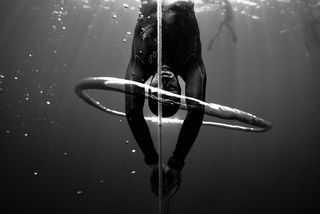
- ‘In my own bubble’ by Kohei Ueno (Winner, Monovision Black & White Photo of the Year 2021)
Freediving is not for the faint-hearted. A discipline of astonishing skill and commitment, it sees divers descend to depths of more than 100 meters while holding their breath – without oxygen tanks for backup.
Himself a keen freediver, photographer Kohei Ueno captured this sub-aquatic snap of French competitor Thibault Guignes during a competition in Bali, Indonesia. Where many might be daunted by the idea of going below the waves with a camera, Ueno lives for it: “I like to freedive, I like to take photos, and I love being underwater.”
Ueno’s award-winning image is a compelling composition. The guide rope draws a stark line through the centre of the frame, while the subject’s inverted orientation creates an unsettling sense of descent. The monochrome palette accentuates the light rays glimmering through the surface, while the unmissable ring of bubbles underscores all that’s surreal and slightly supernatural about this feat of human endurance.
Street
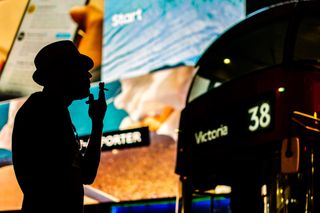
- ‘Evening in Piccadilly Circus’ by Tommaso Carrara (2nd Prize in ‘Urban Life’ category, Landscape Photographer of the Year 2021)
Illuminated by its iconic advertising boards, Piccadilly Circus is one of London’s most photographed squares. Finding a new take on the popular tourist spot is no mean feat, which only makes Tommaso Carrara’s city-centre silhouette that much more striking.
Described by Carrara as “the essence of this city”, the scene is at once low-lit and brightly vibrant, with the smoking figure distinctly outlined against the colourful hoardings behind, while the distinctive London bus leaves you in no doubt as to the photo’s location.
Carrara captured the street snap with a Fujifilm X-T3 at a classic focal length of 35mm. Pairing a shutter speed of 1/250 sec with an ISO of 160 allowed him to sharply freeze the scene’s motion yet retain its moody under-exposure, while a wide aperture of f/1.4 produced the soft background which accentuates the sense of contrast.
- Head to Tommaso Carrara's website or follow him on Instagram
Wildlife
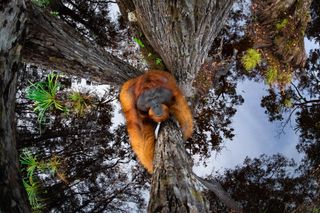
- 'The World is Going Upside Down', by Thomas Vijayan (Nature TTL Photographer of the Year 2021, Overall Winner)
This inventive winner of the Nature TTL Photographer of the Year impressed the judges with its "unique perspective and composition" that ensures "you are immediately trying to figure out what exactly you are looking at".
The photographer Thomas Vijayan explains how he got the shot. "After spending few days in Borneo, I got this frame stuck in my mind. To get this shot, I selected a tree that was in the water so that I could get a good reflection of the sky and its leaves on the tree. The water formed a mirror, making the image look upside-down," he explains.
"Then I climbed up on the tree and waited for hours. This is a regular path for the orangutans to use, so patience would surely pay off," he added. To get the shot, he used a Nikon D850 with an 8-15mm lens and the settings were 1/400 sec at f/4.5, ISO 5,000. So yes, don't be afraid of hitting those higher ISOs if you really need them.
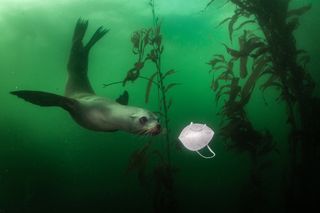
- 'California Sea Lion Plays with Mask' by Ralph Pace (1st Prize in 'Environment' category, World Press Photo of the Year 2021)
A pandemic-related photo with an environmental twist, this shot shows an inquisitive California sea lion investigating a discarded face mask. During the Covid-19 lockdowns, California's natural beauty spots became popular places for those seeking some outdoor escape, but with that unfortunately came a deluge of discarded PPE equipment.
The underwater photojournalist Ralph Pace, who has a graduate degree in Marine Conservation, says he "hopes to act as an interpreter to simplify scientific messages through imagery to tell science and conservation stories". For this photo, he used a Nikon D850 and shot at 1/80 sec at ISO 640.
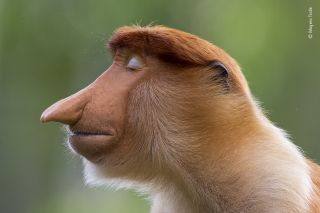
- 'The Pose' by Mogens Trolle (Winner in 'Animal Portraits" category, Wildlife Photographer of the Year)
Locked in meditative thought, if only for a few seconds, this proboscis monkey was "the most laid-back character" according to photographer Mogens Trolle, who is also a zoologist and mammal researcher. Sadly, proboscis monkeys are also endangered as they depend on threatened forests and are hunted for food and traditional medicine.
Still, at least this monkey found time to relax and ponder the great unknowns. Shot using a Canon EOS 1DX DSLR with a 500mm f/4 lens, while balanced on a Manfrotto tripod with a Benro gimbal head, the photo's settings were 1/1000 sec at f/7.1, ISO 1250, which explains why its face and smart haircut are pin-sharp.
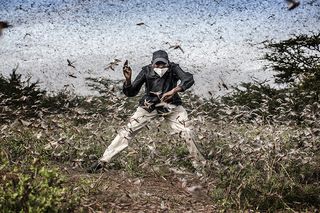
- 'Invasion in East Africa' by Luis Tato (1st Place in 'Wildlife & Nature' category, Sony World Photography Awards 2021)
The Kenya-based photojournalist Luis Tato captured this terrifying shot when swarms of desert locusts, which are among the world's most destructive migratory pests, swarmed in from the Arabian Peninsula and across East Africa in 2020.
Thriving in semi-arid to arid environments, billions of locusts have been feeding throughout East Africa, devouring everything in their path and posing a big threat to the food supplies and livelihoods of millions of people. This photo was part of a series that helped highlight the crisis and deservedly won the 'Wildlife & Nature' category of Sony's World Photography Awards 2021.
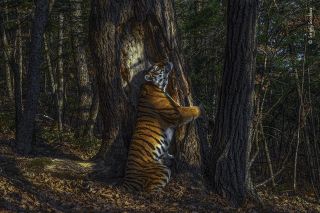
- 'The Embrace' by Sergey Gorshkov (Grand Title Winner, Wildlife Photographer of the Year)
Sometimes wildlife photography involves scarcely believable amounts of patience and dedication – and that was certainly the case here. Photographer Sergey Gorshkov decided he wanted to photograph a Siberian tiger and "from then on, I could think of nothing else", he says. After waiting 10 months, he finally snagged this rare shot of the tiger in its natural habitat.
How did he do it? Naturally, it involved a camera trap system (made by Cognisys), but also a Nikon Z7 with a 50mm f/1.8 lens. The settings for this shot were 1/200 sec at f/6.3 (at ISO 250), and rather than hugging a tree it shows a solitary tiger leaving scent, hairs and other markers on a tree trunk for its cat brethren (and hopefully a mate) to pick up on.
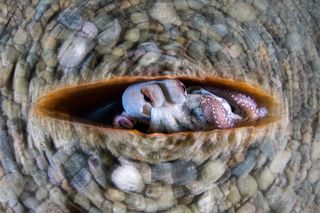
- ‘Circular Octopus’ by Alessandro Grasso (1st Prize in ‘Underwater’ category, Close-Up Photographer of the Year 2021)
At first look, you’d be forgiven for thinking this cephalopod had torn through the space-time continuum. Rather than an inter-dimensional mollusc, the octopus has in fact made its home in an empty noble pen shell – a species of mussel which is being ravaged by a rapid bacterial outbreak.
While the wipeout has left the clams critically endangered, their leftover shells have provided ready homes for other sea creatures – including the octopus captured by Italian diver and underwater photographer Alessandro Grasso.
Grasso got the dramatic shot using a Canon EOS 5D Mk IV with a Sigma 15mm f/2.8 EX DG Diagonal Fisheye lens. Working in shallow Mediterranean waters, Grasso set a relatively low ISO of 160, a narrow aperture of f/22 and a slow shutter speed of 1/13 sec. Grasso explains that he “used a slow shutter speed and circular panning motion to give dynamism to the image and emphasize the subject.”
Smartphone
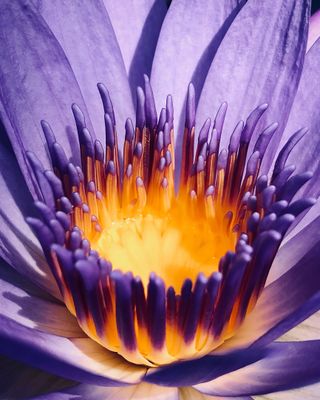
- 'Pondering the Positives' by Christian Horgan (Winner of 'Nature' category, iPhone Photography Awards 2021)
You don't necessarily need the new iPhone 13 Pro or a macro lens accessory to get stunning close-ups of flowers – this winning shot in the 'nature' category of the iPhone Photography Awards was made with nothing more than an iPhone X, a creative eye and some light editing in the default camera app and Instagram.
The photographer Christian Horgan told us: "This waterlily floating on her fish pond captured my eye. The gentle glow from within its perfect petals drew me in. I had my iPhone X with me, and wanted to get a shot where the surroundings weren’t a distraction from the beautiful simplicity of this flower in bloom. Using the phone camera on its standard settings, I went close enough to keep the centre of the flower in focus, but creating a bit of out of focus to add depth" he said.
Does he have any tips for smartphone shooters who want to do something similar? Rather than macro lenses, he says "the best approach is to get as close as you can whilst keeping things in focus, and then crop in with reframing. Slight movements with the phone when close and taking the image can alter the focus points, creating interesting images," he adds.
Landscape
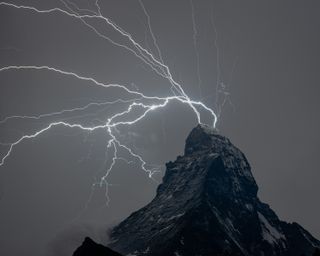
- Untitled by Paul Hammett (1st Prize in ‘Nightscape’ category, Natural Landscape Photography Awards)
Lightning strikes are notoriously tricky to shoot. Capturing the exact moment that multiple lightning bolts hit the distinctive ridge of the Matterhorn? That takes serious skill – and a little bit of luck.
Composition, focus and exposure are never easy to nail at night, let alone when you’re trying to allow for unpredictable bursts of electricity from above. “I was briefly frustrated trying to nail focus and settings in the dark,” explains Hammett, a self-professed mountain enthusiast. “Occasional flashes of nearby lightning helped me recompose, refine focus and adjust settings.”
With a storm crackling all around him in the Alps, Hammett spent 30 minutes pursuing the shot. “Once happy with the camera set up, I could take time to fire off numerous 10 second exposures and just watch the show.” As the clouds moved over the peak, Hammett got his reward. “When these two hit the summit, I knew I had something special in the camera.”
Drone
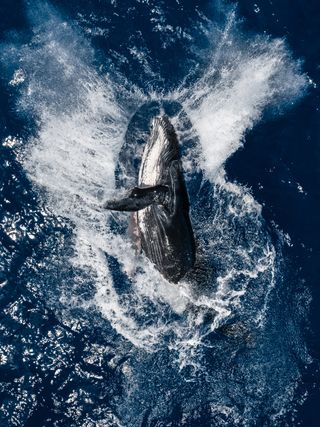
- 'Humpback Breach' by Karim Iliya (Grand Prize Winner, SkyPixel 6th Anniversary Aerial Photo & Video Contest)
A whale 'breach' is when most of its body leaves the water, and humpback whales are particularly adept at doing this thanks to their powerful tail fins. According to the photographer and drone pilot filmmaker Karim Iliya, who took this incredible shot and also happens to be a whale swimming guide, humpbacks do this for "for a variety of reasons including communication, fighting, barnacle and parasite removal, waking up, playing and more."
Whatever this whale's particular reason for breaching, it certainly makes for a spectacular photo – particularly when taken from this unusual top-down viewpoint. It was shot using a DJI Mavic 2 Pro with the exposure settings at 1/400s at ƒ/3.4, ISO 100. More important than the settings, though, are the ability to anticipate a shot like this, with the judges praising it for "taking advantage of shooting from above and the having the right timing to show a unique angle of a breech".
Space
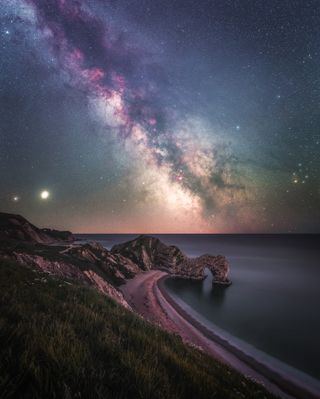
- 'Milky Way rising over Durdle Door' by Anthony Sullivan (Shortlisted for the Astronomy Photographer of the Year 2021)
It may not have won the overall Astronomy Photographer of the Year 2021 prize, but this epic photo was one of the strong contenders on its shortlist. It was shot in England's popular Durdle Door location and its photographer Anthony Sullivan says: "Durdle Door is a perfect spot for astrophotography. The landscape is so interesting and luckily aligns with the Milky Way core during a few months of the year."
Incredibly, Anthony says on his website that he only bought his first camera in 2016, with the intention of using it to film his drumming videos and tutorials. But he quickly fell in love with astrophotography and says "there really is something special about almost freezing to death on the side of a cliff while stargazing, pondering life and wishing you’d brought an extra pair of socks with you". Now that's something all astro fans can agree with.
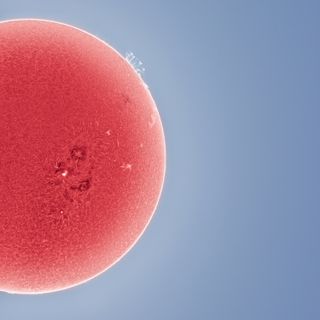
- 'The Magnetic Field of our Active Sun' by Andrew McCarthy (Shortlisted for the Astronomy Photographer of the Year 2021)
If you follow one Instagram account from this page, make it Andrew McCarthy (AKA 'Cosmic Background'). Despite his claims of being "just a normal guy with a telescope", he produces some extraordinary astrophotography by mixing techniques like light painting and HDR moon shots.
This photo doesn't use those techniques, but instead "shows how the magnetic field pulls up portions of the chromosphere following a large solar flare, with the magnetic field lines on crystal clear display along the limb in Hydrogen-Alpha light" says Andrew. Less cryptically, he also says it "remains one of my favorite images of the sun ever" and we're inclined to agree.
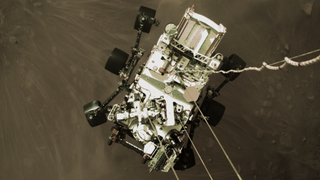
- NASA Perseverance touching down (February 18, 2021)
Okay, this photo hasn't won any photography competitions – and it is also a high-resolution still taken from a video, which was shot by NASA's Perseverance rover as it touched down. But we had to include it in our list of the best photos of the year for World Photography Day because, well, it's an inspiring snap that represents one of the more positive, feel-good stories of 2021.
The Perseverance rover carried a record-breaking number of cameras to the red planet – many of these are there are to help look for ancient microbial life, but others are hand to give us full-color, 20MP snaps like this. If you want to read more about the Wall-E-like rover's camera array, check out our in-depth guide to its cameras and also how it shot that dramatic Mars landing.
- These are the best photo editing apps you can download right now

Mark is TechRadar's Senior news editor. Having worked in tech journalism for a ludicrous 17 years, Mark is now attempting to break the world record for the number of camera bags hoarded by one person. He was previously Cameras Editor at both TechRadar and Trusted Reviews, Acting editor on Stuff.tv, as well as Features editor and Reviews editor on Stuff magazine. As a freelancer, he's contributed to titles including The Sunday Times, FourFourTwo and Arena. And in a former life, he also won The Daily Telegraph's Young Sportswriter of the Year. But that was before he discovered the strange joys of getting up at 4am for a photo shoot in London's Square Mile.
